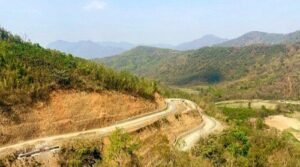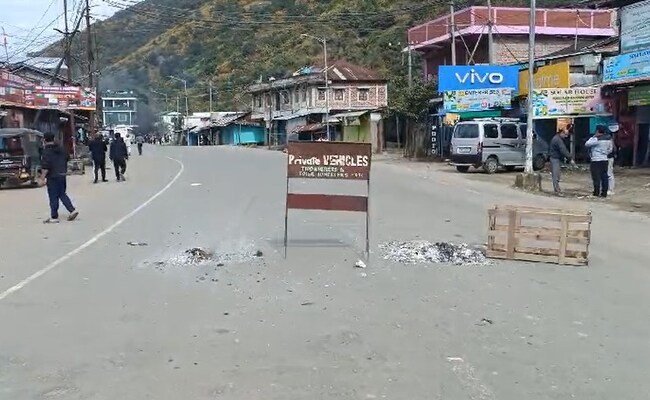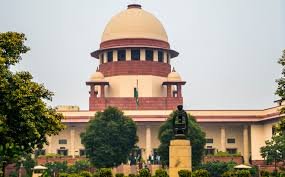A calculated yet cautious response: KZC considers Centre’s appeal to endorse NH-2 mobility—only if safety and equity are assured.
BY Navin Upadhyay
New Delhi, July 25 – In a bid to restore commuters’ safety in Manipur’s conflict-hit landscape, the Ministry of Home Affairs (MHA) has informally urged Kuki-Zo civil society organisations (CSOs) to help ensure safe passage along National Highway-2 (NH-2), particularly through the volatile Kangpokpi district. However, the appeal has exposed a complex dilemma within Kuki-Zo leadership: whether to respond positively to the Centre’s peace overture or remain cautious amid deep-rooted mistrust and unresolved grievances.
According to sources, the MHA believes that, with dialogue ongoing with Kuki-Zo groups under the Suspension of Operations (SoO) agreement, it is reasonable to expect these stakeholders to contribute to de-escalation, i.e. absence of violence. The Centre views the restoration of mobility on NH-2—a critical lifeline connecting Imphal to the northern hills—as an important confidence-building measure. While Nagas, Nepalese, and others have resumed use of the route, psychological barriers continue to hinder broader movement.
The MHA reportedly feels that a formal endorsement from Kuki-Zo CSOs, especially the influential Kuki-Zo Council (KZC), could help dispel these anxieties.
READ: How Forged Press Statements Threaten Peace in Manipur
KZC’s Calculated Stance
The KZC leadership has not opposed the proposal in principle, because as it is it will involve only commercial vehicles and buses and not private transport. In a high-level meeting convened by the Committee on Tribal Unity (COTU) on July 23 in Kangpokpi, KZC members indicated that a formal endorsement could be considered—provided two key conditions were met:
- The Centre must ensure the safety of travellers through the deployment and accountability of central forces.
- Goods ferried into Imphal via NH-2 must also be distributed fairly to residents in the hill districts, who continue to face severe supply constraints.

KZC leaders argued that the Kuki-Zo community itself stands to benefit from a functional and accessible highway, and that offering support for unimpeded movement should not be viewed as a political compromise. “With or without our assurance, neither Meiteis are venturing into the hills nor our people into Imphal. But if the highway remains open, our Naga and Nepali neighbours benefit and it helps us too – when the politics is right, it benefits everyone,” a senior KZC leader was quoted as saying.
Distrust and Dissent from Within
Yet, a section of CSO representatives voiced strong reservations. They warned that a formal endorsement could be perceived as a concession—particularly as the Centre has not done a single positive endorsement for the Kuki Zo people, e.g. to improve and secure the Lamka to Kpi road connectivity, the only lifeline.
Underlying this resistance is a broader dissatisfaction with the Centre’s approach. Despite ongoing talks, there has been little tangible progress on the community’s core demands—chief among them, a separate administrative arrangement and justice for the victims of the May 3, 2023 ethnic violence. Many activists accuse the Centre of prioritising the optics of normalcy over meaningful action, and fear that goodwill gestures could be politically exploited without substantive reciprocation.
The prevailing sentiment among skeptics is that the Centre’s push for normalcy is premature and superficial, lacking acknowledgement of the deeper structural and communal fault lines that led to the conflict.
READ: Opposition Invites Dhankhar for Farewell Dinner
Still, some representatives from the SoO camps remain cautiously optimistic. “Talks with the MHA are progressing. Soon we will be formally discussing our demand for Union Territory. If the government rejects our demands, who is stopping anyone from rebuilding bunkers or setting up roadblocks again? But for now, let’s give peace a chance—at least we won’t be blamed for obstructing it,” a senior Kuki-Zo functionary remarked.
The Kuki-Zo leadership now stands at a critical crossroads—attempting to reconcile its people’s accumulated pain and political aspirations with the immediate need to demonstrate constructive engagement in the peace process. For many, support for NH-2 is no longer just a matter of logistics or security—it has become a barometer of trust in a government that, in their eyes, has yet to prove its sincerity.
Whether the KZC moves toward formal endorsement or opts to remain non-committal could significantly shape the next chapter of both the dialogue process and the political dynamics of Manipur’s fragile hill-valley equation.














